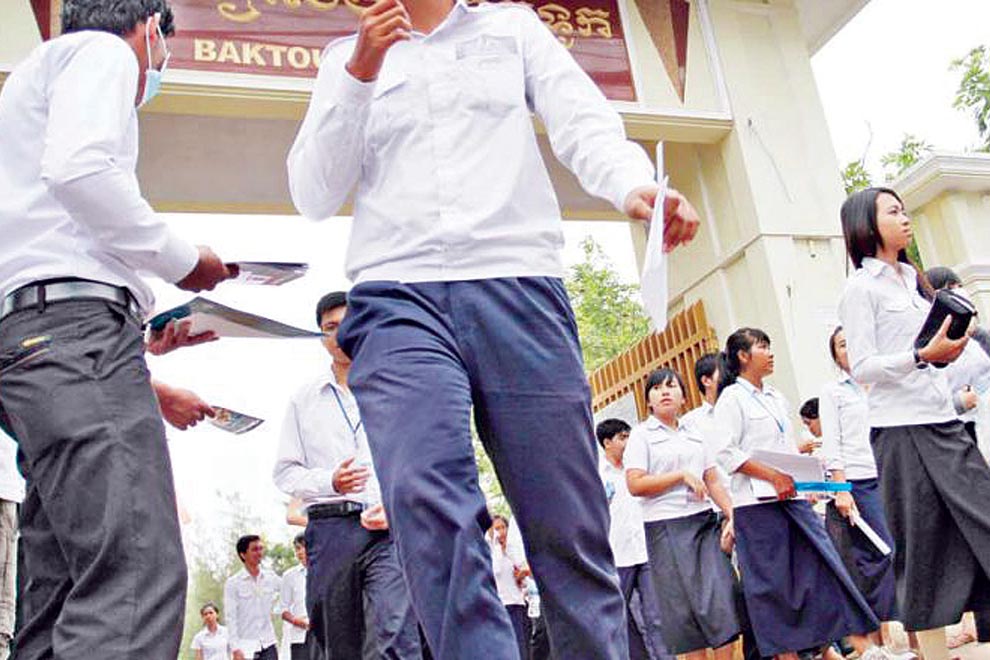
Students leave after taking exams at a school in Phnom Penh in 2013. Pha Lina
Being a young parent is difficult, even when you have access to social services that empower parents to provide optimal care for child development and family support available. Imagine the added difficulty, vulnerability and fear when teenagers – just girls themselves – are thrust into this reality.
This is the situation for tens of thousands of girls in Cambodia who become pregnant before they are adults – a situation that not only ends their own childhood, but puts their young babies at increased risk.
When teenage girls become mothers too early, they are more at risk of birth complications because their own bodies have not yet fully developed, while their children are more likely to suffer from malnutrition and developmental delays. Added to this, they often lack the education, support and resources needed to care for their children as they would like to.
In recent years, the number of teenagers becoming pregnant in Cambodia has increased by 50 percent; a reality that could have profound and long-term effects on the development of Cambodian children. We need a holistic response to this urgent issue, involving not only the implementation of existing government policy in schools on reproductive health and improved access to health care services, but also a nurturing care approach to early childhood care and development that includes all Cambodian children.
For teenage girls, early pregnancy, motherhood and marriage usually mean they must become householders, responsible for cleaning, food provision and child rearing. Their education is often cut short, and their economic opportunities limited, entrenching them in a cycle of poverty that is often passed on from generation to generation.
Added to this, social stigma can bring shame to young mothers and steer them away from using much-needed reproductive health services, and instead towards private clinics that ensure anonymity, but may not meet government safety standards for health care.
Poor school access and high drop-out rates from secondary education mean adolescent parents are likely to miss out on receiving vital information about sexual and reproductive health that would help them understand the risks of early pregnancy.
These are some of the key factors contributing to the recent increase in adolescent pregnancy in Cambodia. Statistics from the Cambodia Demographic and Health Survey 2014 showed that 37 percent of teenage girls who have never been to school in Cambodia have begun having children, as compared to just eight percent of those with secondary or higher education. With the rates of teenage pregnancy increasing so much in Cambodia, this is a huge concern for future generations of children.
The children of young mothers also face significant vulnerabilities. Crucial foundations for life are laid in the first 1,000 days of a child’s life – from conception to age two.
If the development needs of a child are not met during this time, it can have a permanent and detrimental impact on the child’s long-term development. Quality guidance, care, love and protection from harm all have impacts on a child’s future choices, health and well being, and resilience. Currently in Cambodia, a lack of early childhood development services disproportionately affects vulnerable children.
Young parents need access to comprehensive, holistic early childhood development services, which support them to provide their children with responsive, nurturing care, security and safety, opportunities for early learning, and openly available health and nutrition services.
The United Nations Population Fund has emphasised that “more work needs to be done to rectify the misconception that sexuality education encourages early engagement in sexual behaviour”. And while we know the work is not easy, especially since most teachers never received this education themselves, the Royal Government of Cambodia’s Ministry of Education, Youth and Sport has recently developed the Comprehensive Sexuality Education program. Further work is now needed to ensure this policy is extensively resourced and rolled out.
Cambodia has also made progress in expanding access to early childhood development services through the education system, but further learning and investment in effective models of integrated early childhood development service delivery in Cambodia is required.
The coming years provide an opportunity for greater coordination and prioritisation of a more holistic approach to this evolving crisis, and Save the Children is calling upon all organisations, and society, to help ensure teenagers are adequately educated in sexual and reproductive health, and that teenage girls are not forced into marriage or motherhood before they are informed, ready – both physically and emotionally – and want to take that step themselves.
We also ask the Cambodian government to provide leadership and invest in nurturing care from conception through the early years for all children and caregivers, even those living in the most remote, rural and difficult to reach areas.
These efforts will enable Cambodian parents of all ages to provide the necessary nurturing environment for children to thrive, and will ensure that Cambodia’s children can grow together, avoid exclusion, and become productive members of society.
Elizabeth Pearce is the country director of Save the Children in Cambodia









